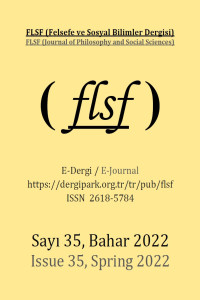Abstract
Bu çalışma, Aristoteles’in phronēsis kavramı temelinde şekillenen eğitim görüşüne odaklanmaktadır. Phronēsis, Aristoteles’te iyi yaşama ile ilgili bir erdem olarak karşımıza çıkar. Eğitimi toplumun bir yansıması olarak gören Aristoteles, Politika isimli eserinde eğitimin doğasını detaylı olarak inceler. Burada özgür insanlara yakışan bir eğitim programının olanaklarını sorgular ve iyi yaşama ile doğrudan bağlantılı bulduğu bir erdem olan phronēsis’i ortaya koyar. Eğitimin temel amacının, iyi ve mutlu bir yaşam sağlamak olduğunu ifade eden Aristoteles’e göre, bir düşünce erdemi olan phronēsis, eğitim yoluyla oluşup gelişmektedir. Bu çerçevede Aristoteles’in Nikomakhos’a Etik ve Politika isimli eserlerinde ortaya koyduğu, eğitimin temel amacının iyi ve mutlu bir yaşam sağlamak olduğu tezi, onun phronēsis kavramı çerçevesinde tartışılacaktır.
Keywords
References
- Anthony Weston, A Practical Companion to Ethics, Oxford: Oxford University Press, 2011.
- Aristoteles. Metafizik, Cilt: 1, çev. Ahmet Arslan, İzmir: Ege Üniversitesi Yayınları, 1985.
- Aristoteles. Nikomakhos’a Etik, çev. Saffet Babür, Ankara: Kebikeç Yayınları, 2005.
- Aristoteles. Ruh Üzerine, çev. Zeki Özcan, Bursa: Sentez Yayıncılık, 2014.
- Aristoteles. Eudemos’ a Etik, çev. Saffet Babür, Ankara: Bilgesu Yayıncılık, 2015.
- Aristoteles. Magna Moralia, çev. Y. Gurur Sev, İstanbul: Pinhan Yayıncılık, 2016.
- Aristoteles. Politika, çev. Mete Tuncay, İstanbul: Remzi Kitabevi, 2020.
- Baird, Forrest E. “Ancient Philosophy”, Philosophic Classics Series Volume I, NJ: Prentice Hall, 2011.
- Brooke, Noel M. ve Kenneth Bruder. Philosophy: The Power of Ideas, Mountain View, CA: Mayfield Publishing Company, 1993.
- Copleston, Frederick. Aristoteles, çev. Aziz Yardımlı, İstanbul: İdea Yayınevi, 1997.
- Çötok, Tufan. “Antikçağ’dan Günümüze Phronesis Kavramı” 1. Felsefede Bugün ve Yarın Konferansları VIII, İzmir: DEÜ Felsefe Bölümü, Aralık 17, 2015.
- Gökberk, Macit. Felsefe Tarihi, İstanbul: Remzi Kitabevi, 2005.
- Doğan, Özlem. “Adalet ve Görelilik”, Kavram ve Düşünce Tarihi Çalışmaları, İstanbul: İnkılap Yayınları, 2006.
- Gruber, Frederick Charles. Historical and Contemporary Philosophies of Education, New York: Thomas Y. Crowell Company, INC, 1973.
- Howie, George. Aristotle on Education, New York: Macmillan, 1968.
- MacIntyre, Alasdair. Whose justice, Which Rationality?, Indiana: University of Notre Dame Press, 1998.
- Von Aster, Ernst. İlkçağ ve Ortaçağ Felsefe Tarihi, çev. Vural Okur, İstanbul: İm Yayınları, 2005.
- Westberg, Daniel. Right Practical Reason, Oxford: Clarendon Press, 2002.
- Weston, Anthony. A Practical Companion to Ethics, Oxford: Oxford University Press, 2011.
Abstract
This study focuses on Aristotle's view of education based on the concept of phronēsis. Phronēsis appears as a virtue related to good living in Aristotle. Considering education as a reflection of society, Aristotle examines the nature of education in detail in his work named Politics. In this book, he questions the possibilities of an education program befitting free people and reveals phronēsis, a virtue he finds directly related to the good life. According to Aristotle, who also states that the main purpose of education is to provide a good and happy life, phronēsis, a virtue of thought, is formed and developed through education. In this context, Aristotle's thesis that the main purpose of education is to provide a good and happy life in Nicomachean Ethics and Politics will be discussed within the framework of his concept of phronēsis.
Keywords
References
- Anthony Weston, A Practical Companion to Ethics, Oxford: Oxford University Press, 2011.
- Aristoteles. Metafizik, Cilt: 1, çev. Ahmet Arslan, İzmir: Ege Üniversitesi Yayınları, 1985.
- Aristoteles. Nikomakhos’a Etik, çev. Saffet Babür, Ankara: Kebikeç Yayınları, 2005.
- Aristoteles. Ruh Üzerine, çev. Zeki Özcan, Bursa: Sentez Yayıncılık, 2014.
- Aristoteles. Eudemos’ a Etik, çev. Saffet Babür, Ankara: Bilgesu Yayıncılık, 2015.
- Aristoteles. Magna Moralia, çev. Y. Gurur Sev, İstanbul: Pinhan Yayıncılık, 2016.
- Aristoteles. Politika, çev. Mete Tuncay, İstanbul: Remzi Kitabevi, 2020.
- Baird, Forrest E. “Ancient Philosophy”, Philosophic Classics Series Volume I, NJ: Prentice Hall, 2011.
- Brooke, Noel M. ve Kenneth Bruder. Philosophy: The Power of Ideas, Mountain View, CA: Mayfield Publishing Company, 1993.
- Copleston, Frederick. Aristoteles, çev. Aziz Yardımlı, İstanbul: İdea Yayınevi, 1997.
- Çötok, Tufan. “Antikçağ’dan Günümüze Phronesis Kavramı” 1. Felsefede Bugün ve Yarın Konferansları VIII, İzmir: DEÜ Felsefe Bölümü, Aralık 17, 2015.
- Gökberk, Macit. Felsefe Tarihi, İstanbul: Remzi Kitabevi, 2005.
- Doğan, Özlem. “Adalet ve Görelilik”, Kavram ve Düşünce Tarihi Çalışmaları, İstanbul: İnkılap Yayınları, 2006.
- Gruber, Frederick Charles. Historical and Contemporary Philosophies of Education, New York: Thomas Y. Crowell Company, INC, 1973.
- Howie, George. Aristotle on Education, New York: Macmillan, 1968.
- MacIntyre, Alasdair. Whose justice, Which Rationality?, Indiana: University of Notre Dame Press, 1998.
- Von Aster, Ernst. İlkçağ ve Ortaçağ Felsefe Tarihi, çev. Vural Okur, İstanbul: İm Yayınları, 2005.
- Westberg, Daniel. Right Practical Reason, Oxford: Clarendon Press, 2002.
- Weston, Anthony. A Practical Companion to Ethics, Oxford: Oxford University Press, 2011.
Details
| Primary Language | Turkish |
|---|---|
| Subjects | Philosophy |
| Journal Section | Research Article |
| Authors | |
| Publication Date | May 20, 2023 |
| Submission Date | February 28, 2023 |
| Acceptance Date | April 24, 2023 |
| Published in Issue | Year 2023 Issue: 35 |
Starting from 2024, our journal will be published in 3 issues as two regular and one special issues. These issues will be published In May (regular issue), September (special issue) and December (regular issue).
Only articles within the scope of the file will be included in our special issue.
Thank you for your attention.

